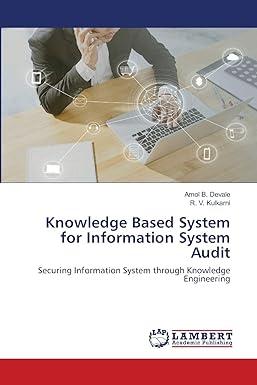Question
Develop the chart similar to Figure 2-3 for the following assignment: Johnson Electronic has requested your advice as to when assets need to be classified
Develop the chart similar to Figure 2-3 for the following assignment: Johnson Electronic has requested your advice as to when assets need to be classified as current assets.
FIGURE 2-3 EIGHT ELEMENTS OF REASONING
Purpose. You reason things out in order to meet some specific end, goal, or objective. If the purpose of goal is unclear or unrealistic, various problems can occur as you proceed. As an accountant/researcher, your primary goal or purpose is to complete accounting/auditing research in order to develop an answer to particular practical issue/problem. You should select clear and realistic purposes and evaluate your reasoning periodically to make sure you still are on target with your stated purpose.
Issue. The second element is to reason out a question or issue. This requires the formulation of the issue in a clear and relevant way. Because accounting/auditing authoritative literature is organized around keywords or concepts, clearly identifying the issue will greatly aid you in researching it.
Information. Data or information exists concerning the issue about which you are reasoning. Any defect in the data or information is a possible source of problems in conducting research. As an accounting practitioner, you will use client-provided data and both authoritative and nonauthoritative sources in reasoning out a solution. Therefore, you need to be mindful that the data or information may contain defects or contradictions, especially in the client data or nonauthoritative sources.
Concepts. Reasoning uses concepts that include theories, principles, or rules. A basic understanding of the concepts is important as you reason out an accounting/auditing issue.
Assumptions. All reasoning begins somewhere. Incorrect assumptions in your reasoning can be a source of problems and can bias your research. You must determine that your assumptions are justifiable and how they will shape your point of view in conducting research.
Interpretation. The sixth element of reasoning requires that what you infer from your research is based on the evidence gathered. All reasoning requires some type of interpretation of the data in order to draw conclusions from the research process.
Implications. As you conclude the research process and begin to develop conclusions, you need to consider the various implications or consequences that arise from your reasoning. Consider both negative and positive implications as you develop your conclusions.
Conclusion. The final element of reasoning is the conclusion to the research question or issue. As you develop the conclusion, be careful to have the proper point of view-one that is not too narrow or broad, or based on misleading information or contradictions.
Step by Step Solution
There are 3 Steps involved in it
Step: 1

Get Instant Access to Expert-Tailored Solutions
See step-by-step solutions with expert insights and AI powered tools for academic success
Step: 2

Step: 3

Ace Your Homework with AI
Get the answers you need in no time with our AI-driven, step-by-step assistance
Get Started


